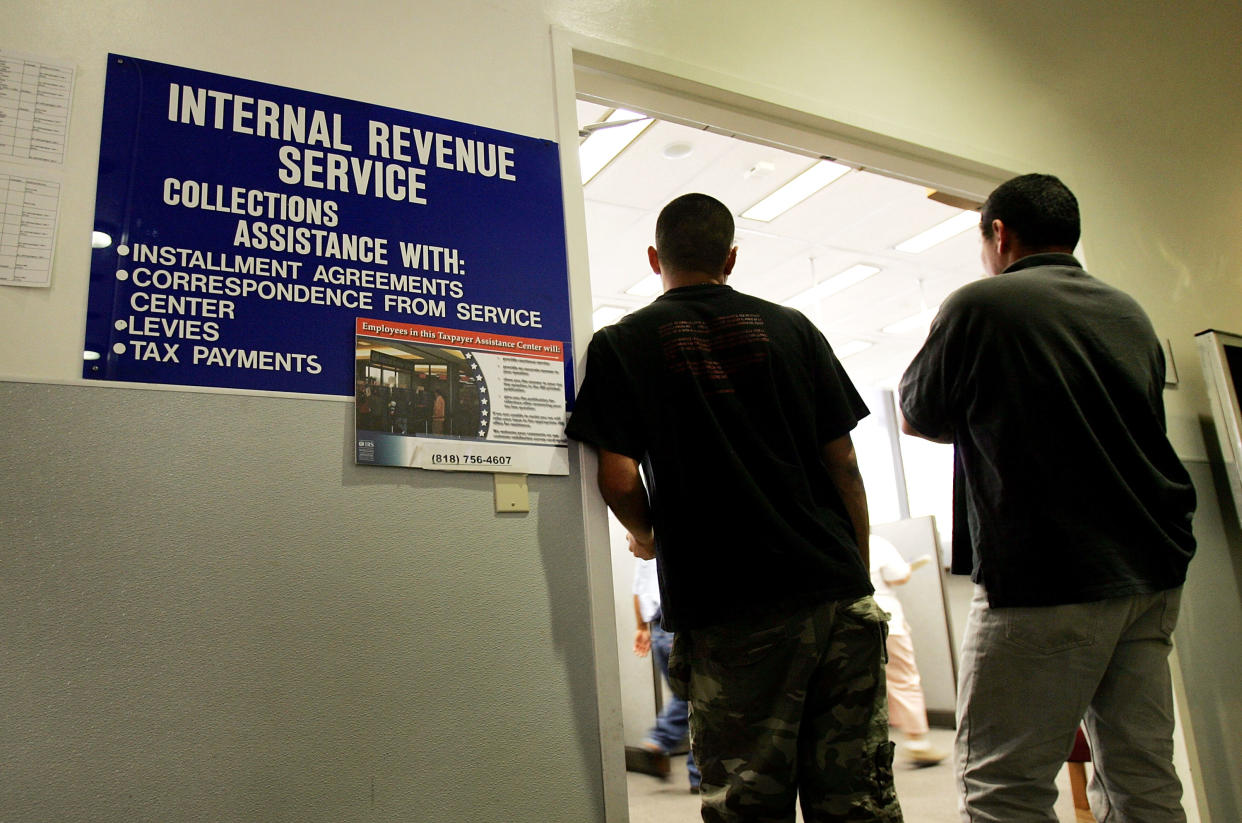Taxes 2022: What to do if you can’t pay your taxes by tax day
With tax day approaching quickly, some Americans who owe may feel financially unprepared to pay their tax bill by this year’s April 18 deadline.
Fortunately, the Internal Revenue Service offers several options to pay your taxes – but you need to act fast.
“The IRS does have programs like installment programs and ways to get an extension to pay,” Nancy DeRusso, managing director and head of financial wellness at Goldman Sachs Ayco Personal Financial Management, told Yahoo Money. “But if you know you can’t pay, the best thing to do is file forms and work with the IRS to get installment payments – otherwise you’re going to get more penalties.”
Here’s what to know.
Request a repayment plan
If you’re facing an outstanding tax balance you can’t pay off anytime soon, there’s no need to panic.
According to the IRS, you may qualify for a self-service, online payment plan that allows you to extend your payment deadline and pay off your debt at your own pace. This, however, is not to be confused with an extension to file – which is a completely different application form.
“Some people file an extension thinking they are getting an extension to pay their taxes, but that’s one of the things we want to demystify. An extension to file is not an extension to pay,” said DeRusso.
To get an extension to pay your taxes, you must submit an online application (OPA) before the tax deadline, which could differ from April 18 depending on your state or circumstances.
Once you submit your application, you’ll get an immediate notification on whether your payment plan has been approved. Online payment plans include short-term and long-term payment plans. If you apply for a payment plan through OPA, you can set up a short-term payment plan for up to 120 days at this time.

“Short-term repayment plans offer a payment period of 120 days [through OPA]. This option is available for taxpayers who owe less than $100,000 dollars. There is no formal application and accrued penalties and interest apply until the balance is paid in full,” said Eric Bronnenkant, CPA, CFP and head of tax at Betterment.
Short-term payment plans are also available for a maximum of 180 days, but you must call the IRS at 800-829-1040 and file a formal application through a Form 9465 to set up the installment agreement. The same rule applies if you have to request an extension plan that exceeds 180 days.
“A taxpayer can also apply for an installment agreement (streamlined agreements have a maximum term of 72 months) if they owe less than $50,000,” Bronnenkant said. “Application fees typically apply but can be reduced for low-income taxpayers. Accrued penalties and interest apply until the balance is paid in full.”
The IRS offers several ways to make your monthly payments including a direct debit from your bank account, automatic payroll deductions, payment by EFTPS, as well as payment by credit card via phone or internet.
You could also pay using a check, money order, or in cash at a retail partner. For those that pay by check, be wary of mailing delays. The IRS processes all mail in the order in which it was received, as is facing a backlog dating back to April 2021.

Offer a compromise
Another way to pay off your tax obligations may be through an Offer in Compromise, said Bronnenkant. This is an agreement between the IRS and the taxpayer to settle the tax liability for less than the owed amount.
According to the National Taxpayer Advocate, a compromise could be a time-consuming process. But if the IRS doesn’t reject, return, or withdraw your offer within two years of the postmarked date received, the offer will be accepted.
Some reasons why the IRS may accept your offer include a ‘doubt as to collectibility’, meaning the IRS determined that you don’t have enough income to pay off your balance in full. Your case may also be accepted if the IRS finds that you could pay off your balance, but it would cause severe economic hardship.
“This option is intentionally not easy to qualify for and anyone considering it should go through the pre-qualifier tool,” Bronnenkant said. “Factors that are considered are an ability to pay, income, expenses, and asset equity. Application fees typically apply, but can be reduced for low-income taxpayers.”

Don’t put it on a credit card
Having a tax liability can add pressure on your finances, but don’t put it on your credit card, Rus Garofalo, founder of Brass Taxes previously told Yahoo Money.
With the Federal Reserve set to increase its benchmark interest rate up to six times this year, the rate on your credit card will also increase.
According to Garofalo, you should pay off your state debt first as these carry higher interest rates than the federal government. Depending on the year, your federal debt can have an interest rate ranging from 3% to 5%, which is often much lower than state interest rates.
“For the federal government debt, I like to tell people to see it as a nice credit card with a low interest rate. They’ll give you up to six years to pay off your taxes, as long as you don’t ignore them for a long time,” Garofalo said. “They won’t do anything, they just want to get paid, and they are very understaffed, so they don’t want to chase you around.”

Gabriella is a personal finance reporter at Yahoo Money. Follow her on Twitter @__gabriellacruz.
Read the latest personal finance trends and news from Yahoo Money.
Follow Yahoo Finance on Twitter, Instagram, YouTube, Facebook, Flipboard, and LinkedIn.
